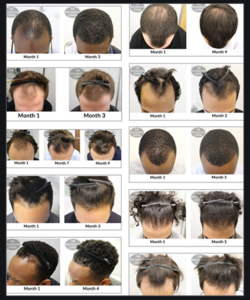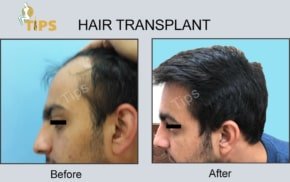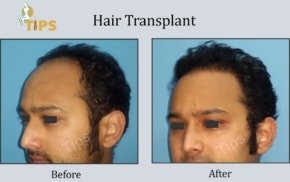The most common cause of hair loss is a condition known as “androgenic alopecia” or “male pattern baldness”. Nearly 95% of hair loss in men is because of this condition.
Some of the factors which can cause this condition are:
During a hair transplant, the bald–resistant hair follicles from the back of the head are transplanted to the bald area of the head. This procedure is permanent since the hair follicles from the back of the head are resistant to baldness regardless of where are they are transplanted. Check out this hair transplant article to know more about it.
No, the hair transplant procedure does not hurt since the patient is given local anesthesia in both the donor and the recipient areas. Post-surgery the patient might feel some numbness along with minimal discomfort which is common after any surgery.
If the hair loss is bothering you, then it’s the right time to start thinking about getting hair transplant procedure done. If not treated at the young age the hair loss will likely continue. Check out this page to know if you’re the right candidate for the hair transplant.
We usually get patients with age over 21 years. Though it is advised to address your hair loss problem as soon as possible.
Men who have progressed to class 3 or above in Norwood Scale are considered to be the right candidate for the surgery. Below is the Norwood Scale Chart.

Hair transplant in Chandigarh
Yes but as of now, hair cloning is not an option since it is still in its early stages. The idea behind hair cloning is that the healthy follicle cells are extracted from donor areas and multiplied by various culturing methods. The newly produced cells are then injected in the bald scalp.
Yes, the doctors at TIPS have performed a lot of successful moustache and beard hair transplants. There are no complications during or after the surgery. The hair can be trimmed or shaved like any other hair.
Check out the beard & moustache hair transplant surgery performed at TIPS:
Absolutely. The surgery can be done on any type of hair, whether it is curly, straight, wavy or kinky. Though there have been few cases reported where the texture or the appearance of the hair might be changed after the hair restoration process.
The amount of time the surgery takes depends on the number of grafts that need to be transplanted. For patients who require 1000 grafts, it can take somewhere between 3-4 hours. For patients who require more than 2000 grafts the time taken could be anywhere between 5-7 hours.
Yes, the results of hair restoration surgery are permanent since the hair transplanted from the donor area is not susceptible to balding.
The growth process usually begins after 3-4 months and but can vary from person to person. Though most of the patients see the bulk of the growth within 8-12 months after the procedure.
The risks associated with the surgery are very minimal and extremely rare. The patient might experience bleeding or some scarring which subsides within 2-3 days post-surgery.
Yes, even women experience hair loss. It is estimated that around 40% of women suffer from female pattern hair loss at some point in their lives. So women’s hair transplant surgery is possible.
TIPS is one of the premier institutes that makes use of advance technological methods for hair transplantation of individual hair follicles. This new approach takes hair restoration to new levels of precision and artistry, since the pattern and direction of each hair can be controlled.
Check out before and after images of hair transplant performed at TIPS:




